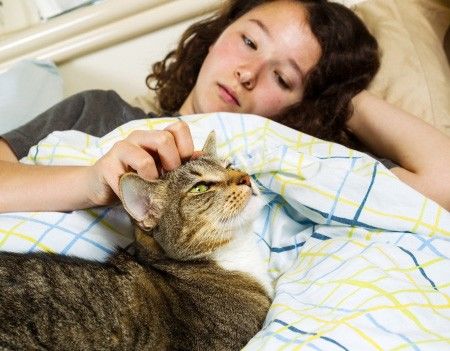There’s an expression that says that anyone who doesn’t like cats just hasn’t met the right cat yet. It’s been proven that owning a cat can lower stress, provide companionship and help with emotional issues, such as depression and anxiety. (Maybe cat ladies everywhere are onto something?)
Most cats are playful and mischievous, providing hours of entertainment and fun for the whole family. Many people view their pets as members of the family and include them in family activities such as taking them on vacation with them, buying them holiday presents and even setting up their own social media accounts.
Although a cat can seem like a member of the family, is it a good idea to allow them to sleep in the bed? Here’s a compilation of pros and cons to extending your cat’s invite from housemate to snuggle buddy so you can decide what will work for you.
Pros
- Sense of Security
- Personal Heaters
- Emotional Healers
- Make Morning Routines Easier
Cons
- Asthma
- Disruptive Sleep
- They Could Get You Sick
- Destructive Behavior
PROS
Sense of Security
According to medical research, sleeping with a cat could offer a sense of security and aid in relaxation. About 56 percent of pet owners allowed their pet to sleep in bed with them, most of which did so because of that extra sense of comfort the pet provided to ensure a deep and restful sleep.
It’s also suggested that pets can actually aid in becoming calm and help quiet the mind. Even though your cat couldn’t necessarily call the police if you needed immediate help, just knowing you are not alone in a room could help you find sleep sooner than expected.
Personal Heaters
Cat lovers can tell you that one of the best feelings is when you’re cozy in bed with a warm, purring cat curled around your feet. In the old days, some people would take hot water bottles to bed with them to heat up the sheets for comfort. Cats naturally crave warmth, so if there’s a cozy spot in bed, they’re going to go for it.
With a cat, you get a fuzzy, warm companion that is a natural heater. An extra bonus is when cats do that cute thing with their paws that looks like their making biscuits. “Kneading” is a common behavior in cats and it can actually mean that your cat is marking you as their own! Kneading is also a behavior that occurs when a cat is ready to sleep, so it’d be easy for one to grow accustomed to the behavior signaling sleep.
Emotional Healers
Pets are often seen as domestic companions and can help with depression and loneliness. Cats are especially intuitive and can sometimes tell when their owners are feeling down. It’s not uncommon for cats to come to their owner’s aid whenever a bout of depression or sadness hits.
Sometimes it is even beneficial for people to talk to their pets. Whether it’s a big business proposal speech that you’re working on or just some bad thoughts you need to get worked out, a cat is the perfect partner to listen. Although they will not be able to respond verbally, cats communicate with their pet parents in different ways. In fact, they don’t meow at each other to communicate, they only do this to “talk” to their humans.
Make Morning Routines Easier
Cats are naturally creatures of routine. It’s not uncommon for a cat to become a natural alarm clock by waking you up with paw pats or nudges instead of a jolting alarm buzzer or radio. They prefer to keep a schedule and will adhere to yours quite easily.
If you wake up at 6 a.m. every morning, your cat will know and get used to the routine. Waking up typically means breakfast for humans and their pets – and cats are definitely not going to choose sleep over food.
It’s also been studied that single people tend to wake up in a happier mood having a cat in the bed. Not only do cats provide that morning companionship, but sometimes the simple act of petting your cat can ease any stress before facing the day. A recent study also proves that the bond is especially powerful between women and their cats.
CONS
Asthma
Although it’s been researched that living with cats can actually boost the immunities, unfortunately, some medical issues are unavoidable. For asthma sufferers, especially children with asthma, owning a cat can be detrimental to health.
Night time for asthma sufferers could especially be difficult if a cat is in the room, much less sleeping in a bed with them. A medical study in the UK suggests asthma sufferers could become allergic to cats over time, if they aren’t sensitive to cat fur already.
Disruptive Sleep
Although studies suggest people sleep better with pets, cats are commonly nocturnal animals which means they can be especially active a night. Although cats can adhere to their human’s sleep patterns and nighttime routine, cats can get a wave of playfulness and disrupt sleep. It’s not uncommon for cats to want you to play with them in the middle of the night and waking up to a cat attacking your foot is not the most pleasant way to wake up.
Since cats are creatures of routine, that also means no sleeping in on the weekends. If your cat has already associated the Monday through Friday 6 a.m. routine with breakfast, you better believe they will expect the same routine on the weekends, too.
They Could Get You Sick
If your cat has fleas or, even harder to detect, ringworm, then you could be in for a nasty surprise come bedtime. Fleascould be pesky critters to get rid of if your cat isn’t on regular flea prevention. Fleas will bite and can sometimes spread diseases such as typhus.
Ringworm is highly contagious and if your cat has it, then you’ll more than likely get it, too. Since the infection starts under your cat’s fur, you may not even realize your cat has ringworm until you discover it on your own body.
Even though cats can carry elements that could make you sick, if you’re up-to-date with your pet’s healthcare checkups, you should be fine.
Destructive Behavior
In the case that you just don’t want your cat to sleep in bed with you and kick him or her out, they could “punish” you with destructive behavior.
Some of these behavioral issues could include making a mess, knocking things over or ripping things apart, incessant meowing and/or marking their territory. According to WebMD, sleeping with a cat should be perceived as an “all or nothing” concept. If you decide to allow and then disallow your cat to sleep with you, the cat will think he or she is “banned” from the territory, causing the aforementioned behavior.
No one wants to wake up in the middle of the night to see what the cat is destroying. Careful consideration should be taken in deciding to let your cat in the bedroom so he or she won’t feel neglected or betrayed.
Conclusion
Overall, before sleeping with your pet, it’d be best to weigh out the pros and cons to see if it’s something you’re ready to commit to. Whether you’re more comfortable with your cat in or out of the bedroom, it needs to be a routine you stick to so your cat doesn’t become confused about boundaries. Ultimately, you are the “alpha” of your pet pack and should find a sleeping plan to make the whole group happy.







